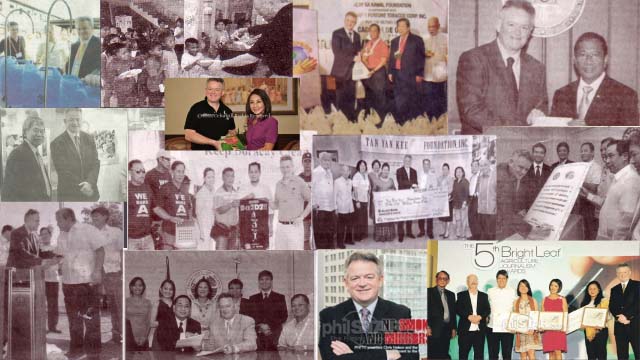SUMMARY
This is AI generated summarization, which may have errors. For context, always refer to the full article.

(First of two parts)
MANILA, Philippines – Tobacco companies are at the forefront of the corporate social responsibility (CSR) movement in the country. The catch: they are using community work to skirt around laws regulating their industry, both in the national and local levels.
Anti-smoking advocates say tobacco companies are using CSR projects to discreetly promote their product in the face of a law prohibiting them from advertising in paid media.
CSR work is also a way for cigarette companies to gain access to local elected officials who have the power to approve and implement anti-smoking policies.
Rappler gathered a list of CSR activities in the Philippines that tobacco companies have reported in the last few years. It reveals a trend: in most of the areas where tobacco companies are engaging in supposed philanthropic activities, the local governments have delayed or abandoned pending anti-smoking ordinances.
In other areas, meanwhile, blatant attempts by tobacco companies to block such ordinances have been observed.
Alternative promotion
Republic Act 9211 or the Tobacco Regulation Act of 2003 put a stop to tobacco companies’ main marketing strategy – that is, advertising in paid media, paricularly television, radio, and newspapers.
The law, however, has failed to prevent tobacco companies from penetrating the content reported by free media.
Through the tobacco companies’ CSR activities – such as donations, community projects, educational and environmental partnerships with local government units and government agencies – their brands have been the subject of news.
For example, Philip Morris Philippines Manufacturing Inc.’s P16-million donation to the Philippine National Red Cross made news in 2009. Their brands and logos were very visible as the world watched news on rescue, relief, and rehabilitation efforts for the victims of back-to-back typhoons Ondoy and Pepeng.
Red Cross chairman Richard Gordon, then also a senator, thanked Philip Morris for its generosity, noting that the company’s donation was one of the biggest, if not the biggest, that a multinational company had given the typhoon victims.
Anti-tobacco advocates are skeptical.
“There’s no such thing as CSR as far as tobacco companies are concerned. They just use that to promote their product and make even larger profits,” stressed former health secretary Alex Padilla.
A World Health Organization (WHO) report in 2008 said, “Corporate social responsibility is crucial to the tobacco industry for restoring its damaged reputation, improving employee morale and maintaining and increasing the value of company.”
In 2010, Philip Morris formed PMFTC Corp., a 50-50 joint venture with rival Fortune Tobacco Corp. of the Lucio Tan group, creating a virtual monopoly of the local tobacco market with over 90% share.
Philip Morris’ CSR spending in the Philippines has not gone below US$ 1 million since 2008. In fact, it more than doubled to $2.25 million in 2011 from $1 million in 2010.
Anti-smoking ordinances
More than skirting the advertising ban, advocates say tobacco companies are using CSR in blocking or delaying the passage of anti-smoking ordinances in the provinces, cities, and municipalities.
“CSR does many things, but the biggest of them all is it influences policy makers,” noted Ulysses Dorotheo, coordinator for Southeast Asia and western pacific regions of the Southeast Asian Tobacco Control Alliance.
The WHO 2008 report expressed the same view, noting that much of the industry’s influence over the legislative agenda had been achieved through political donations.
“The tobacco industry uses philanthropy to achieve legislative goals, making contributions to policymakers’ favorite charities and exploiting the presentations of cheques as opportunity for lobbying,” the report said.
Currently, the country has two laws regulating smoking: the Tobacco Regulation Act of 2003 and the Clean Air Act of 1999 (RA 8749).
The Tobacco Regulation Act bans smoking in enclosed public areas and requires establishments to designate smoking areas.
The Clean Air Act, on the other hand, bans smoking inside public buildings or enclosed public places, vehicles, “enclosed areas outside one’s private residence, private place of work or any duly designated smoking area.”
While they are national laws, their implementation is ensured by local government units (LGUs).
This is why tobacco control advocates and tobacco companies have brought the battle to this level.

A source who is formerly a director of Philip Morris confirmed to Rappler that tobacco companies use CSR to influence LGU officials and negotiate against anti-smoking policies.
“It’s either bribe or in the form of CSR. We ask them what they need – for example, school buildings,” the source said.
Some LGU officials eventually fall for one or the other, the source added. “Bibigay din ‘yan. Kapag nagsimula nang tumanggap, hawak na namin ‘yan (They will eventually relent. When they start accepting [donations], then we’ve got a hold on them).”
Data from the Department of Health (DOH) show that out of 1,714 LGUs in the country, only 146 have anti-smoking policies that comply with all or some of the provisions of RA 9211 as of May 2012.
Of these compliant LGUs, 125 have “comprehensive” anti-smoking policies. They implement a 100% smoke-free indoor policy, follow restrictions on selling cigarettes to and by minors, and comply with the advertisement ban, the DOH said.
Based on data that Rappler gathered from anti-smoking advocates, the areas where tobacco companies conducted CSR activities are not among the 146 provinces, cities, and municipalities that have anti-smoking policies. The advocates collated newspaper reports on CSR activities.
Also noteworthy is that CSR activities of tobacco companies are focused on local governments with whom they mainly do business with. Tanuan City in Batangas and Candon in Ilocos Sur are examples. Philip Morris has a manufacturing plant in Tanuan, while Ilocos Sur is among the tobacco-growing provinces in Northern Luzon.
Tobacco companies have been known to have a long-running relationship with northern Luzon LGU officials and congressmen, who champion their interests. The Northern Luzon alliance in Congress had blocked the passage of laws that aimed to discourage consumption of cigarette products in the country.
Some LGUs compromise?
Meanwhile, even in provinces considered as early adopters of health reforms in the country, tobacco companies appear to have successfully interferred in policy making.
For instance, the DOH has identified 12 pilot provinces for the implementation of Article 8 of the Framework Convention on Tobacco Control (FCTC), an international treaty to which the Philippines is a signatory.
Article 8 states: “Each party shall adopt and implement in areas of existing national jurisdiction as determined by national law and actively promote at other jurisdictional levels the adoption and implementation of effective legislative, executive, administrative and/or other measures, providing for protection from exposure to tobacco smoke in indoor workplaces, public transport, indoor public places and, as appropriate, other public places.”
The DOH says its project aims to “localize” the tobacco regulation law through the implementation of “100% smoke-free indoor ordinances” in the 12 provinces.
These are:
- Nueva Vizcaya
- Oriental Mindoro
- Romblon
- Capiz
- Negros Oriental
- Biliran
- Eastern Samar
- Southern Leyte
- Misamis Occidental
- North Cotabato
- South Cotabato
- Agusan del Sur
The 12 provinces are considered early adopters of health reforms, according to DOH. They have functional local health boards, which plan, coordinate, and monitor health activities from the municipal up to provincial levels.
Of these provincial governments, 7 have passed 100% smoke-free indoor ordinances; one has an existing tobacco ordinance that needs amendment to comply with Art. 8 of FCTC, 3 have smoke-free ordinances filed but have yet to be approved; and one has no anti-smoking ordinance at all.
Out of 199 cities and municipalities in these 12 provinces, 99 so far have 100% smoke-free indoor policies; 37 have existing tobacco ordinances that need amendment; 49 have pending smoke-free ordinances filed for approval; and 14 have no anti-smoking ordinances.
The DOH, however, said 4 provinces have delayed the passage or have not passed such ordinances because of the interference by tobacco companies through CSR projects. These are Mindoro Oriental, Capiz, Misamis Occidental, and South Cotabato.
The CSR activities in these 4 provinces range from social event sponsorships to donations to municipal and city councils, the local legislative bodies that have the power to pass ordinances and resolutions. – Rappler.com
Fat Businessman image from Shutterstock
Cigarette image from Shutterstock
Add a comment
How does this make you feel?
There are no comments yet. Add your comment to start the conversation.